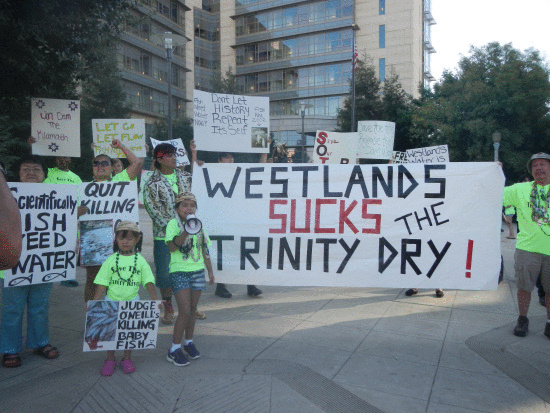File photo by Regina Chichizola.
Once again this year, two huge Central Valley agricultural districts have failed to block the release of Trinity River water designed to help threatened fall salmon runs at the mouth of the Klamath River.
Late last week, the two bodies — Westlands Water District and the San Luis & Delta-Mendota Water Authority — petitioned a federal judge to block the release of up to 88,000 acre-feet of cool Trinity water to combat parasite conditions at the mouth of the Klamath. Though the same strategy has been used habitually in drought years past, the two agricultural districts characterized such releases as “literally flushing” water away, in a time of drought.
But the court today denied the Central Valley’s request for a restraining order preventing the Bureau of Reclamation from releasing the water, exactly as it did last year and — after some dithering — the year before that.
The strategy of releasing comparatively cool and clean Trinity River water at critical points during the fall salmon run was developed in the wake of the 2002 Klamath fish kill, when a runaway infestation of the ich parasite killed somewhere in the neighborhood of 70,000 returning chinook and coho salmon.
Press release from the Yurok Tribe:
A few minutes ago, Judge O’Neill of the United States District Court for Eastern California in Fresno denied Westlands and San Luis & Delta-Mendota Water Districts’ motion to immediately halt flows from the Trinity River necessary to avoid a catastrophic fish kill in the lower Klamath River. The Court determined that any potential harm to the irrigators from an uncertain loss of added water supply was outweighed by the potentially catastrophic damage to salmon in the absence of supplemental water.
“This is a great victory for the Klamath River and its salmon,” said Chairman Thomas P. O’Rourke. “We are gratified that the judge saw through their desperate efforts to disparage the needs of the fish and to discredit our science. We’d also like to thank Congressman Huffman, as well as Humboldt County and our co-management partners for their support on this important issue.”
The Klamath River was the site of a catastrophic fish kill in 2002 that claimed between 33,000 and 78,000 Chinook salmon, including hundreds of threatened coho salmon. In subsequent years, adequate river flows have prevented a repeat of this catastrophe. The Yurok Tribe and its fisheries co-managers including other tribal, federal and state agencies, have worked hard to develop the science that guides these difficult decisions. The Yurok Tribe maintains senior water rights sufficient to maintain its fishery in the lower Klamath River.
PREVIOUSLY
- Tribes, Fishermen, Allies Protest in Fresno; Decision on Trinity River Releases Expected Today
- HALLELUJAH! The Trinity Restraining Order is Lifted, and the Water Will Flow
- Fish Kill 2014? No Preventative Trinity River Water Releases This Year, Announces Bureau of Reclamation
- ‘There are fish missing the scales on their bellies and rolling on the bottom of the river’
- (PHOTOS) Dead Fish and Gill Rot in the Trinity River
- (VIDEO) ‘Fish Kill 2014?’: Yurok Youth Video Project Looks at a Developing Crisis
- ‘Fish Need Water! Let the River Flow!’: Tribal Members Protest in Sacramento (VIDEO/PHOTOS)
- [UPDATING] Victory! Feds to Revise Trinity River Water Delivery Schedule This Morning
- Central Valley Irrigators File Suit To Stop Trinity Water Releases
- Rivers to Flow: Judge Denies Injunction on Trinity Water Release
- BOR Releases More Trinity Water in Response to the Appearance of Fish-Killing Parasite
- Feds Finally Assert Humboldt’s Right to Trinity River Water Under 1955 Agreement
- Huffman Demands Federal Action to Prevent Klamath River Fish Kill
- As Fish Kill Fears Grow, Hoopa Valley Tribe Blasts Bureau of Reclamation’s Draft Trinity River Release Plans

CLICK TO MANAGE